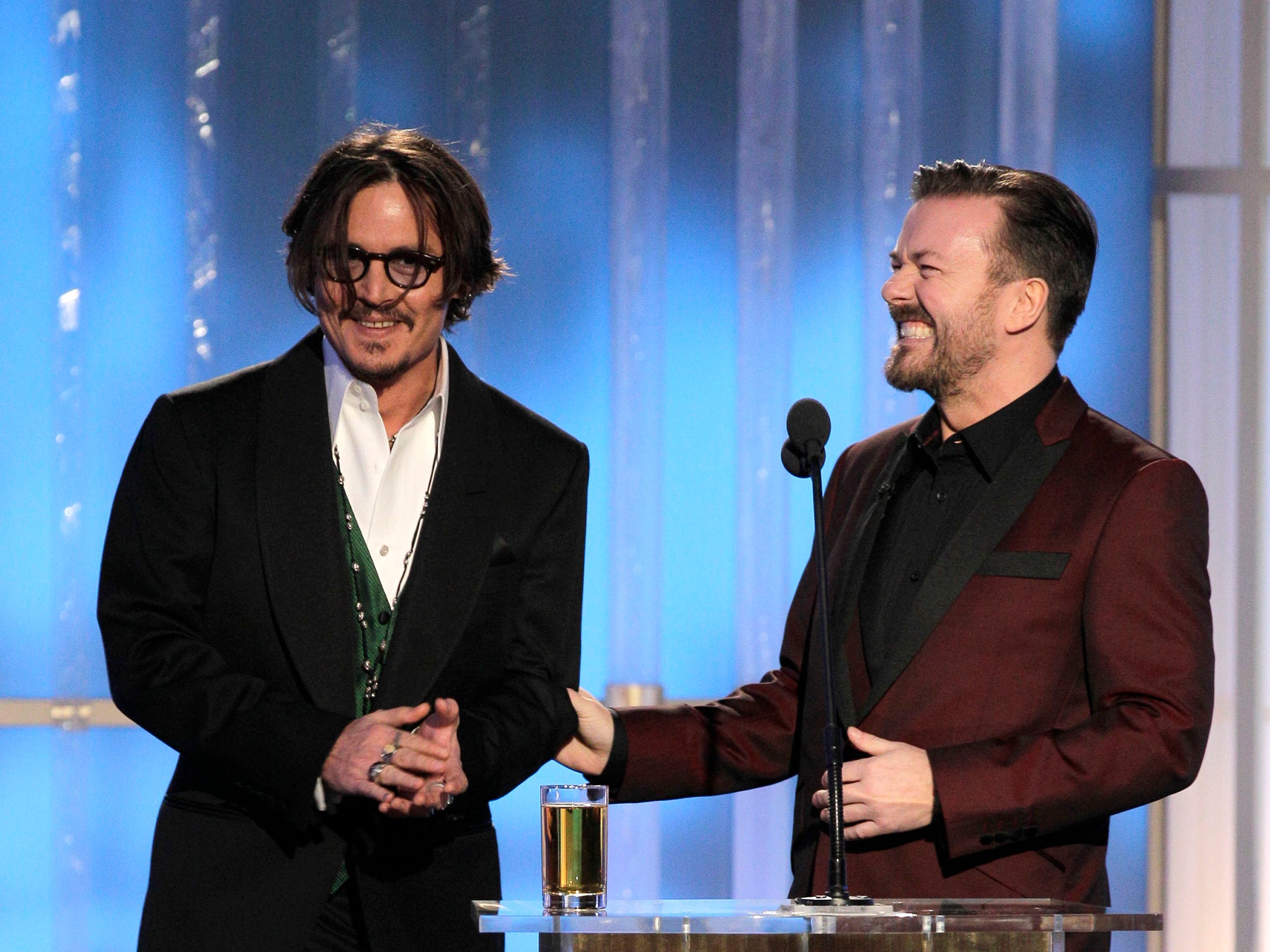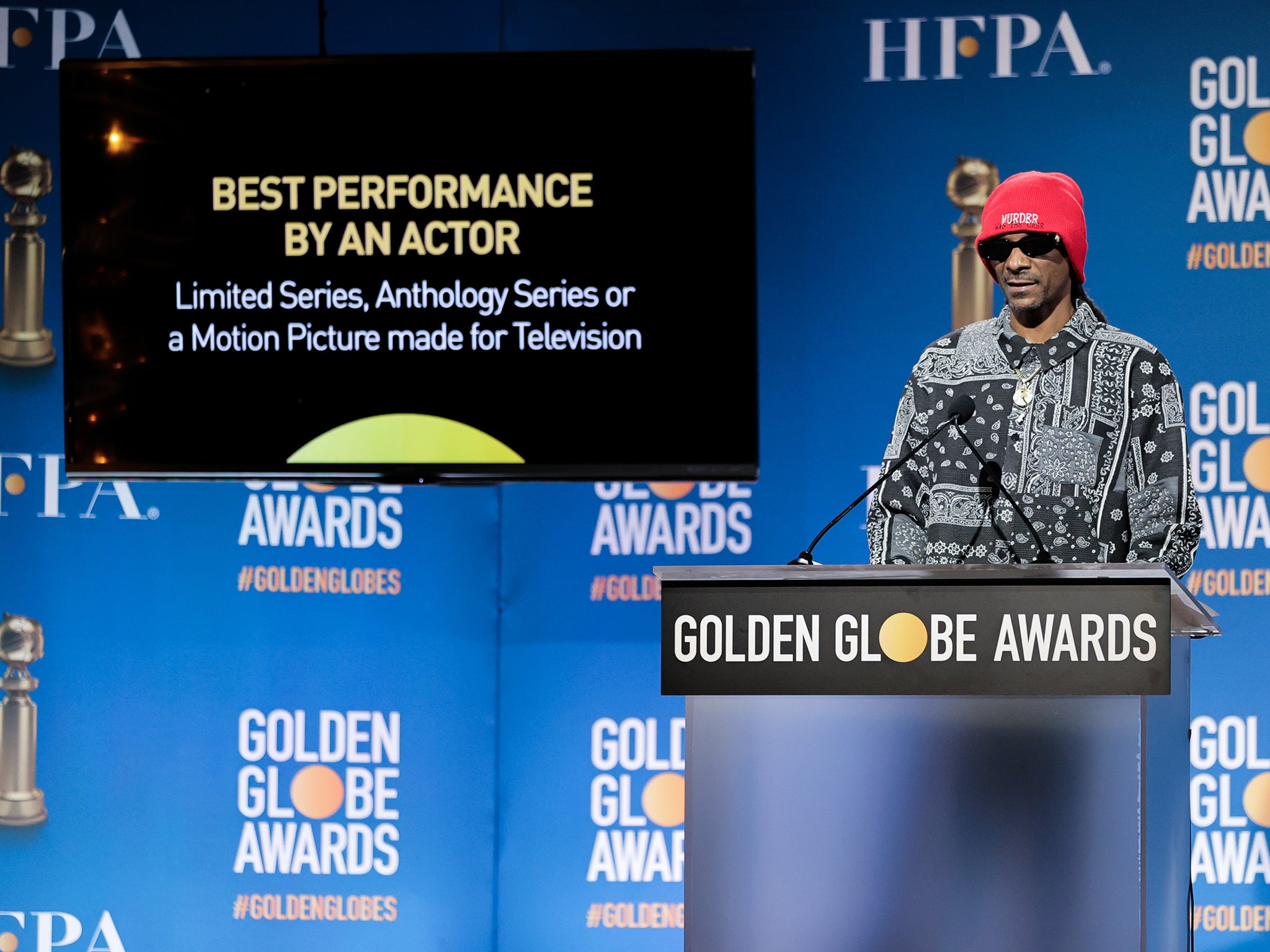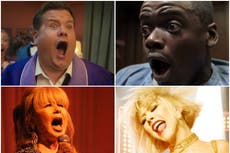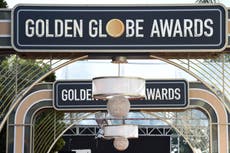Ricky Gervais was right – how the ‘worthless’ Golden Globes lost their sheen
The 2022 Golden Globes take place this Sunday, but they won’t be televised and there will be no audience (or A-listers). Kevin E G Perry investigates how the once-glittering awards became quite so toxic


If an awards show happens in a swanky Beverly Hills hotel and there’s no one around to watch it, does anyone still care? That’s the philosophical conundrum facing the Golden Globes in 2022, which are set to go ahead this Sunday despite not being broadcast on television by NBC for the first time since 1996. There will also be no live audience, no red carpet and, according to Variety, no stars either handing out or collecting the once-coveted baubles. Just two years ago, the Golden Globes were the sort of glitzy Hollywood occasion where Brad Pitt would happily bound on stage to collect an award as A-Listers like Al Pacino, Martin Scorsese and Cate Blanchett applauded from the front row. This year, it’s a conference room meeting that could have been an email. How exactly did the Globes lose their sheen?
It’s all to do with the Hollywood Foreign Press Association (HFPA), the tiny group of international journalists and critics that has run the Golden Globes since they were founded in 1944. By that time, the Academy Awards were already established as the preeminent film awards in Hollywood, having been handed out since 1929. In 1956, the Golden Globes added awards for television and began building a reputation as the brasher counterweight to more formal ceremonies like the Oscars and the Emmys. They were also decidedly boozier: a typical bash would see attendees finish off 9,000 glasses of Moët & Chandon champagne. Hosting the Golden Globes in 2012, Ricky Gervais helpfully delineated the difference between the rival awards. “For any of you who don’t know, the Golden Globes are just like the Oscars, but without all that esteem,” quipped Gervais, to much laughter from the assembled stars. “The Golden Globes are to the Oscars what Kim Kardashian is to Kate Middleton,” he continued. “A bit louder, a bit trashier, a bit drunker, and more easily bought – allegedly!”
The suggestion that a Golden Globe – or at the very least, an unearned nomination – could be bought by the wealthy and powerful had by then dogged the HFPA for decades. In 1982, Pia Zadora beat out hotly tipped stars like Kathleen Turner to win New Star of the Year, shortly after HFPA members had been flown to a casino in Las Vegas by Zadora’s multimillionaire husband Meshulam Riklis. Three decades on, similar whispered allegations surrounded the nomination of the Johnny Depp and Angelina Jolie stinker The Tourist, whose distributor Sony also flew HFPA members to Las Vegas – and threw in tickets to a Cher concert for good measure.
Accusations of financial impropriety at the HFPA grew still more serious last February. A week before the pandemic-hit 2021 Golden Globes show in which most nominees dialled in via video call, the Los Angeles Times published an investigation into the HFPA which found that the group regularly pays its members – which at the time numbered just 87 people – substantial fees for appearing on its various committees, with the total sum nearing $2m. That figure was more than double what the group had paid out just three years earlier, and had led even some HFPA members to wonder aloud whether the organisation’s leadership were using the significant windfall generated by the Golden Globes broadcast as a get-rich-quick scheme. “It’s a beautiful idea to take the money from NBC and give it to good causes like tuition and to restore films,” one anonymous HFPA member told the LA Times. “But there is a spirit now to milk the organisation and take the money. It’s outrageous.”
That was by no means the extent of HFPA’s troubles. There was also the fact, highlighted by a social media campaign by Time’s Up, that not a single one of its 87 members was Black. A full six years on from #OscarsSoWhite, this lack of diversity among HFPA members (relatively few of whom actually work full time for major international news outlets) was compounded by some baffling nomination decisions. Notably, in 2021 the widely panned first season of Emily in Paris was nominated for two Golden Globes, while Michaela Coel’s superb, critically acclaimed series I May Destroy You was completely ignored. Was this evidence of racial bias, inquiring minds wondered, or was it anything to do with the fact that no less than 30 HFPA members (a third of the organisation!) had been flown to Paris by the producers of Emily in Paris where they were wined and dined and put up in a $1,400-a-night hotel?
Neither potential answer reflected well on the HFPA, and they acknowledged that clearly some sort of change was needed. In May 2021, their leadership announced a package of reforms including increasing the number and diversity of their members, the establishment of new senior administrative positions including a chief diversity, equity and inclusion officer, and the introduction of an oversight board for what they called “critical organisational reform”. Hollywood’s response? Too little, too late.
First came the streamer boycotts: both Amazon and Netflix announced they were suspending dealings with the HFPA until after reforms had been made. Next came the A-List revolt. In a damning statement, Scarlett Johansson urged the entire industry to join the boycott. “As an actor promoting a film, one is expected to participate in awards season by attending press conferences as well as awards shows,” she said. “In the past, this has often meant facing sexist questions and remarks by certain HFPA members that bordered on sexual harassment. It is the exact reason why I, for many years, refused to participate in their conferences. The HFPA is an organisation that was legitimised by the likes of Harvey Weinstein to amass momentum for Academy recognition and the industry followed suit. Unless there is necessary fundamental reform within the organisation, I believe it is time that we take a step back from the HFPA and focus on the importance and strength of unity within our unions and the industry as a whole.”

Tom Cruise agreed, and mailed the Golden Globes he’d won for Born on the Fourth of July, Jerry Maguire and Magnolia back to the HFPA in another embarrassing development for the beleaguered organisation. On 10 May, just a week after HFPA leaders had optimistically launched their plans for reform, NBC announced that as “change of this magnitude takes time and work, and we feel strongly that the HFPA needs time to do it right”, they would not be broadcasting the Golden Globes in 2022.
The question the HFPA will be hoping Sunday night’s subdued Golden Globes answers is whether they really have been putting in that work. They have, at the very least, diversified their membership. In October, they announced that 21 new members had joined the organisation, with much fanfare given to how diverse the group is (according to HFPA, of the 21 new members: 48 per cent identify as women, 29 per cent identify as Black, 24 per cent identify as Asian, 29 per cent identify as Latinx and 19 per cent identify as Middle Eastern/North African). While this new cohort may have increased the size of HFPA by 20 per cent, it still remains tiny compared to, for example, the Academy of Motion Picture Arts and Sciences, which awards the Oscars. The Academy has somewhere around 10,300 members, of whom roughly 9,400 are eligible to vote on the Oscars. As Johansson suggested in her statement, the implication is that the much smaller voting pool involved in the Golden Globes makes it much easier for decisions to be swayed by studios seeking to spend their way to a publicity boost.

Watch Apple TV+ free for 7 day
New subscribers only. £9.99/mo. after free trial. Plan auto-renews until cancelled.
ADVERTISEMENT. If you sign up to this service we will earn commission. This revenue helps to fund journalism across The Independent.

Watch Apple TV+ free for 7 day
New subscribers only. £9.99/mo. after free trial. Plan auto-renews until cancelled.
ADVERTISEMENT. If you sign up to this service we will earn commission. This revenue helps to fund journalism across The Independent.
The Golden Globes have a reputation problem, and it’s one that’s been festering since long before their current predicament. When he returned to host the awards once again in 2016, Ricky Gervais used his monologue to call them “worthless” and told the assembled stars that they were merely “a bit of metal that some nice old confused journalists wanted to give you in person so they could meet you and have a selfie with you”. If the Globes are to shine once again, the HFPA will have to prove their champagne-soaked awards are more than just an excuse to hand out prizes to whoever had the fanciest press trip.
Join our commenting forum
Join thought-provoking conversations, follow other Independent readers and see their replies
Comments


Bookmark popover
Removed from bookmarks